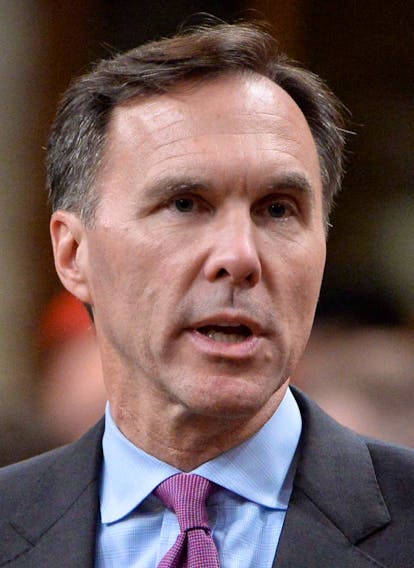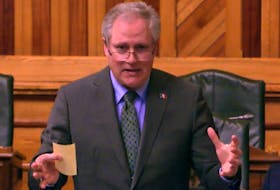The federal government released a fiscal snapshot Wednesday that projects a budget deficit of $342.2 billion in 2020-21 — the largest since the Second World War, and much higher than the $28.1 billion that was forecast prior to the COVID-19 pandemic.
This will push Canada’s debt to an estimated $1.2 trillion.
The deficit is largely due to record emergency aid spending to offset the unprecedented impact of the COVID-19 pandemic on Canadians and the Canadian economy, which was virtually shut down to curb the spread of the coronavirus. According to the snapshot document, nearly 5.5 million Canadians lost their job or had their working hours reduced.
Addressing the House of Commons after tabling the 170-page snapshot document, Finance Minister Bill Morneau said the spending amounts to more than $212 billion in direct support to individuals and businesses, representing nearly 14 per cent of Canada’s GDP.
This has been doled out through a number of aid programs for Canadians, such as the Canada Emergency Response Benefit ($53.53 billion), the Canada Emergency Student Benefit ($1.42 billion), the Canada Emergency Wage Subsidy ($18.01 billion) and various top-ups to benefits such as the GST, Old Age Security and Canada Child Benefits, as well as loans and grants for business of all sizes.
“To date, nearly nine out of every 10 dollars in COVID-19-related direct support delivered to Canadians, and to Canadian businesses, is financed by the federal government,” Morneau said.
“We took on this role because it was the right thing to do.”
Morneau said while some will criticize the government on the cost of these measures, the size of the deficit is more of a testament of the impact the pandemic had on the economy. Stimulus spending, Morneau said, will decrease unemployment, increase consumer spending and help the economy recover faster.
“Our government knew that the cost of inaction would have been far greater,” he said.
“At a time when Canadian workers and families are facing significant hardship, austerity and tightening your belt is not the answer.”
A full economic update or budget is expected later this year.
Canada in a good spot

Speaking with Saltwire Network, Nova Scotia MP and Associate Minister of Finance Sean Fraser said what Canada has essentially been able to do is replace the volume of money that was pulled out of the economy as a result of the pandemic and put it in with money that will be financed over the long term.
“A lot of the money that we owed was coming to maturity, and we had the opportunity to refinance because of the pandemic,” he explained.
“Given the current environment around interest rates, we're going to be able to finance these programs at a rate that is cheaper than it was a year ago.”
Fraser said Canada is borrowing at a rate below one per cent, which means the debt servicing cost to Canadians is $4 billion less than it was before the pandemic hit, as a result of these reduced interest rates.
“The massive investments we've made, we've been able to stave off the worst consequences for Canadian households and businesses. We are in a position where we're able to manage this debt sustainably,” he said.
But that doesn't mean Canada is out of the woods, Fraser said.
“The whole outcome is going to continue to depend on the success of our public health response, which has been excellent today compared to a number of other international competitors, most notably the United States,” he said.
“Whether Canadians continue to practice physical distancing, wear a mask when they can't practice physical distancing, wash their hands, stay home, where they can, will be the biggest predictor of economic success coming out of this pandemic.”
Critics call for plan to reopen economy
In a statement, official opposition and Conservative Leader Andrew Scheer criticized the government’s high spending and lack of a plan to restart the economy.
“Under Justin Trudeau’s watch, Canada is falling behind. We have the highest unemployment rate in the G7. We are the only G7 country to have lost its AAA credit rating. And we are the only G7 country without a recovery plan,” Scheer said.
“The debt-to-GDP ratio is rising, the deficit has exploded to $342.2 billion, and they have completely lost control over the federal debt, which for the first time will reach over $1 trillion this year.”
Scheer said in order to be competitive, Canada needs to focus on the private sector.
“Help Canadians get back to work. Support small businesses. Lower taxes, cut red tape and make Canada an attractive place to do business once again,” he said.
The Canadian Chamber of Commerce also had concerns about the snapshot. President and CEO Perrin Beatty said in an emailed statement that a deficit of $342 billion with a debt-to-GDP ratio of 49.1 per cent will undermine Canada’s fiscal capacity for decades.
“It is now time for Canada to transition from a subsidy-based crisis response toward restoring economic growth and getting Canadians safely back to work. With much less fiscal breathing room and fewer financial tools available to us, we must focus on the economic fundamentals,” Beatty said.
“Canada needs a clear plan to restore private-sector growth, starting with a tailored strategy and a timetable for safely reopening that will allow businesses and families alike to plan. We need a longer-term fiscal plan and forward guidance from the government.”
Twitter: @notandrea
-With files from Reuters









